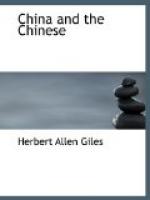To express an interrogative, we say,—
[ta lai bu lai] t’a lai pu lai
= “he come no come?” i.e. “is
he
coming?”
submitting the two alternatives for the person addressed to choose from in reply.
The indefinite past tense is formed by adding the word [liao] liao or lo “finished":—
[ta lai liao] t’a lai lo = “he come finish,” = “he has come.”
This may be turned into the definite past tense by inserting some indication of time; e.g.
[ta zao shang lai liao] = “he came this morning.”
Here we see that the same words may be indefinite or definite according to circumstances.
It is perhaps more startling to find that the same words may be both active and passive.
Thus, [diu] tiu is the root-idea of “loss,” “to lose,” and [liao] puts it into the past tense.
Now [wo diu liao] means, and can only mean, “I have lost”—something understood, or to be expressed. Strike out [wo] and substitute [shiu] “a book.” No Chinaman would think that the new sentence meant “The book has lost”—something understood, or to be expressed, as for instance its cover; but he would grasp at once the real sense, “The book is or has been lost.”
In the case of such, a phrase as “The book has lost” its cover, quite a different word would be used for “lost.”
We have the same phenomenon in English. In the New York Times of February 13, I read, “Mr. So-and-so dined,” meaning not that Mr. So-and-so took his dinner, but had been entertained at dinner by a party of friends,—a neuter verb transformed into a passive verb by the logic of circumstances.
By a like process the word [su] ssu “to die” may also mean “to make to die” = “to kill.”
The word [jin] chin which stands for “gold” as a substantive may also stand, as in English, for an adjective, and for a verb, “to gold,” i.e. to regard as gold, to value highly.
There is nothing in Chinese like love, loving, lovely, as noun substantive, verb, and adverb. The word, written or spoken, remains invariably, so far as its own economy is concerned, the same. Its function in a sentence is governed entirely by position and by the influence of other words upon it, coupled with the inexorable logic of attendant circumstances.
When a Chinaman comes up to you and says, “You wantchee my, no wantchee,” he is doing no foolish thing, at any rate from his own point of view. To save himself the trouble of learning grammatical English, he is taking the language and divesting it of all troublesome inflections, until he has at his control a set of root-ideas, with which he can juggle as in his own tongue. In other words, “you wantchee my, no wantchee,” is nothing more nor less than literally rendered Chinese:—
[ni yao wo u yao] ni yao wo, pu yao = do you want me or not?




